We’ve spent plenty of time here diving into the possibilities and potential dangers of Artificial Intelligence chatbots like ChatGPT and others. But there are other types of AI emerging on the market that do much more than generate realistic, “human-sounding” text. Other systems allow users to input video and still images to create alarmingly real-looking “deep fake” videos. Audio options are available as well, allowing the AI to imitate pretty much anyone’s voice after being trained with enough samples. So I suppose it was only a matter of time before someone decided to combine them all together and create a virtual person. The “somebody” in question turned out to be Wall Street Journal columnist Joanna Stern. She built a clone of herself that could participate in phone calls and video conferences. And then she decided to trick her family, her friends, and even her bank to see if they could detect the fakery. And the frightening part is that it worked, at least for a while. (Subscription required)
Over the past few months, I’ve been testing Synthesia, a tool that creates artificially intelligent avatars from recorded video and audio (aka deepfakes). Type in anything and your video avatar parrots it back.
Since I do a lot of voice and video work, I thought this could make me more productive, and take away some of the drudgery. That’s the AI promise, after all. So I went to a studio and recorded about 30 minutes of video and nearly two hours of audio that Synthesia would use to train my clone. A few weeks later, AI Joanna was ready.
Then I attempted the ultimate day off, Ferris Bueller style. Could AI me—paired with ChatGPT-generated text—replace actual me in videos, meetings and phone calls?
For subscribers, there is a seven-minute video at this link where you can watch and listen to the clone in action. It’s a rather surreal experience. I went into the video knowing that I would be seeing a clone and even then I was nearly fooled for a little while.
To be clear, the clone isn’t perfect. It definitely looks just like the author and the voice is nearly a perfect match. But the clone employs very few facial expressions and almost never moves its arms. She sounds okay when speaking brief sentences, but the longer the answers become, the more the voice sounds somewhat robotic. It’s very close, though. And you just know if that the technology has come this close in such a short period of time, these clones will be indistinguishable from their human creators in the very near future.
So what does that mean for society? Such a clone could initially be used to play some relatively harmless pranks on your friends and family as the author did. But she was also able to have the clone place a call to her bank and be put through to an account manager with no problem. She considered trying to take a day off from work and let the clone do her job for her.
I’m sure you can see where this is going. If you’re someone who posts a significant amount of photos and videos of yourself on social media and your voice is included, someone else could download all of that. And then they would be able to create a new you. This takes the concept of identity theft to an entirely new level.
And what if you followed Stern’s lead and built a clone that was actually capable of doing your job? (Only if your work is exclusively done online, of course.) You might fool your boss a couple of times, but an obvious question would almost immediately come to their mind. If there’s an online version of one of their workers that’s capable of performing the job, why should they bother paying you? Concerns have already been expressed about AI replacing professional actors. How much less would it have cost to make the latest Top Gun movie if they could get away with using a digital Tom Cruise?
After that, how long will it be until the increasingly lifelike robots that are already coming onto the market are combined with all of the AI technology listed above? Some people, particularly the transhumanists (who I personally think are insane) actually view all of this as progress and a good idea. All I see is a futuristic nightmare. We humans are apparently such clever animals that we’ll eventually invent ourselves out of existence.







Join the conversation as a VIP Member